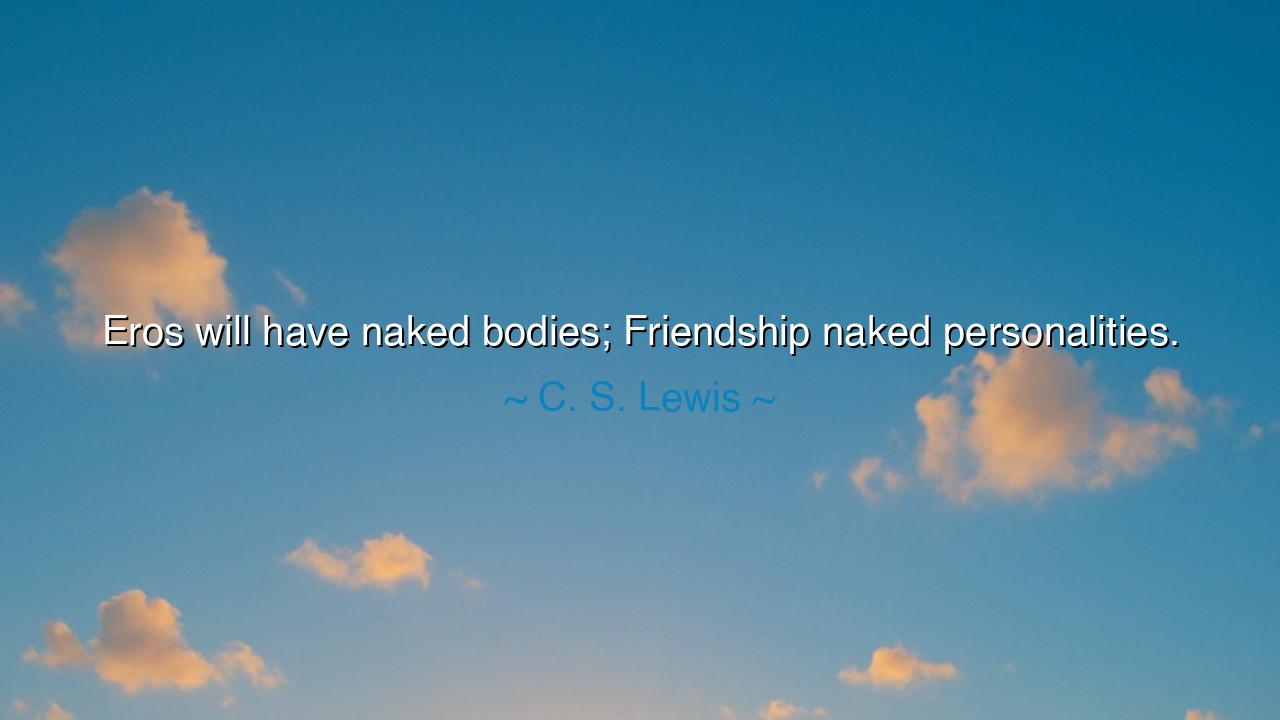
Eros will have naked bodies; Friendship naked personalities.






“Eros will have naked bodies; Friendship naked personalities.” Thus wrote C. S. Lewis, the great philosopher of the heart, whose words uncover the hidden truths of human affection. In this single sentence, he captures the sacred distinction between two of the purest and most profound forms of love. Eros, the passionate love between lovers, reveals itself through the union of bodies, through desire and longing, through the physical communion that binds one to another in intimacy. But Friendship, Lewis tells us, is of a different and perhaps higher order—it is the meeting of souls, the unveiling of the inner self, where not flesh but personality stands bare. It is the love of the spirit, stripped of masks and pretense, where two hearts stand unclothed before each other in truth.
The origin of this quote lies in Lewis’s masterpiece, The Four Loves, where he sought to understand the many shades of human affection—Storge, the love of family; Philia, the love of friends; Eros, the love of romance; and Agape, the divine love that transcends them all. In distinguishing Eros from Friendship, Lewis spoke not to diminish one, but to illuminate both. Eros is passionate and consuming—it unites two through the body, binding them in a desire that can be fierce, tender, and creative. Yet Friendship, by contrast, is serene, intellectual, spiritual—it draws two souls together not through need or attraction, but through shared vision, virtue, and truth. It is, as Lewis described, “side by side,” not “face to face.” It is the love that looks outward together upon a common horizon.
When Lewis says “Eros will have naked bodies; Friendship naked personalities,” he reveals that each form of love has its own sacred intimacy. In Eros, two lovers stand physically exposed before one another, their bodies joined in passion and vulnerability. But in Friendship, there is an even rarer and deeper nakedness—the exposure of the soul. For to be a true friend, one must dare to be seen as one truly is, without disguise or defense. In this nakedness of spirit lies courage greater than any physical unveiling: to show one’s flaws, one’s doubts, one’s dreams, and still be met not with judgment, but with understanding.
Consider, for example, the legendary friendship between David and Jonathan in the Scriptures. They were warriors, sons of rival kings, yet their bond transcended politics, envy, and danger. When Jonathan gave David his armor and robe, it was not a mere gift—it was a symbolic laying bare of the self. He gave up his claim to the throne, offering his friend not only his trust, but his very future. Their friendship was not born of desire or necessity, but of recognition—a meeting of souls who saw in each other something divine. In this, they exemplified what Lewis meant: that true friendship reveals the personality, the soul, in all its truth and glory.
Such friendships are rare and sacred. They cannot be forced, nor are they born of convenience or flattery. They arise when two souls discover in one another a shared love for truth, beauty, or goodness—when they say, as Lewis described, “You too? I thought I was the only one.” In that moment of recognition, the walls that separate one heart from another fall away. There is no need for masks, for competition, for pretense. Two personalities stand before each other—naked, yet unashamed. And in this mutual honesty, a kind of spiritual love is born, one that neither time nor distance can easily destroy.
Lewis’s insight also serves as a warning in an age that confuses intimacy with exposure, and connection with contact. The world often seeks the closeness of bodies, but fears the vulnerability of hearts. Yet to be known in spirit—to have one’s personality laid bare—is a rarer and deeper intimacy than any physical act. True friendship demands that we risk honesty, that we reveal our inner selves not for pleasure but for communion. It asks that we listen without envy, speak without deceit, and love without condition. Such friendship is the soil in which virtue grows, and the balm that heals the wounds of loneliness.
Let this be the lesson of Lewis’s wisdom: cherish both Eros and Friendship, but know their difference. Do not mistake the closeness of flesh for the closeness of soul, nor the thrill of passion for the peace of understanding. Seek friendships that allow your true self to emerge unguarded, where you may be known fully and loved nonetheless. Be willing to stand spiritually naked before those you trust, and offer them the same grace in return. For only in such friendships can the human heart find rest from the world’s disguises.
In the end, as C. S. Lewis reminds us, Eros is the fire that warms the body, but Friendship is the light that illuminates the soul. The one may fade with time or distance, but the other, if tended with honesty and affection, becomes eternal. For to stand before another soul in naked truth—and be seen, accepted, and loved—is not only the measure of friendship; it is the reflection of the divine within us all.






AAdministratorAdministrator
Welcome, honored guests. Please leave a comment, we will respond soon